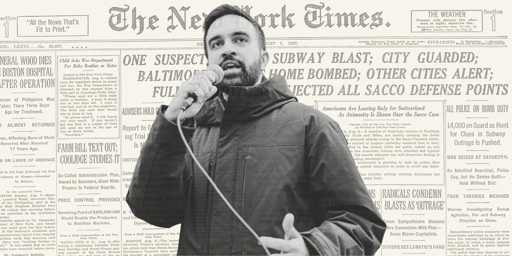- cross-posted to:
- hackernews@lemmy.bestiver.se
- cross-posted to:
- hackernews@lemmy.bestiver.se
I’m not sure how I landed here, so apologies if this is a repost. It’s quite worth the read. If anyone still believes the NYT is worth the paper it’s printed on, this is a great example of why it isn’t.
It’s remarkable, the people you’ll hear from. Teach for even a little while at an expensive institution—the term they tend to prefer is “elite”—and odds are that eventually someone who was a student there, who maybe resided only on the far periphery of your professional orbit, will become one or another kind of famous. At that point, out of the vast and silent ether, messages will come glowing into your inbox one after another. Do you remember this person? they will say. Was he your student? Did you work with him? We’re hoping for some insight—would it be possible for us to talk for a bit?
I taught at a place called Bowdoin College for 16 years, and during the last of those there was a student in attendance you’ve perhaps heard of. His name is Zohran Mamdani. And so, shortly after his startling, spirit-lifting victory in the primary last spring, the gentle flood of inquiries commenced. Word had gotten out not only that he went to Bowdoin—again, a very pricey, very wealthy, quite comprehensively the-thing-that-it-is small liberal arts college on the East Coast—but that, while there, he had majored in something called “Africana Studies.” You can probably see where this is going.
The first few messages wondered if I knew him (I don’t think I did, though I certainly had students who did, and do), if I taught him (possibly? but in truth not that I remembered), but mostly if I could say something about what he might have been reading and doing and studying, there in his time at this little college on the coast of Maine. More than once, the name “Frantz Fanon” was broached—which had the virtue of certain hand-showing clarity.
Emphasis mine. They started with framing that had to be met, no matter how wrong it was.
I was about to share this too. Beat me to it. The NYT is a shame and has become pure propaganda against liberalism!
This is the insane article from NYT in case anyone wants to read it: https://archive.ph/zlmBY#selection-535.0-535.66
This was a wonderful read. Thanks.
Always happy to please!
It’s aside the author’s point, but this note is killing me.
Beneath its humdrum requests, every email said more or less the same thing: Can you explain how reading certain things can turn a person into a socialist—and, possibly, a terrorist-sympathizing antisemite? It’s a storied gambit of the right at its most grimly predictable. “People read Foucault,” the redoubtable David Brooks once wrote, in an actual column that I’ve all but committed to memory, “and develop an alienated view of the world.”
Okay, so where’s all the discourse about Trump keeping a copy of Mein Kampf on his nightstand, Times? If reading Foucault gives you an “alienated world view,” and you take issue with Mamdani engaging with “African studies,” the fuck does that make Hitler-loving Trump?
I know, I know, the double standard is the point, and the goal was never to make an honest argument but… Come on! grumble grumble
Don’t be so obtuse. African studies and Foucault are not in the same orbit as hitler. It would be maybe notable if a public figure kept a copy of “Discipline and Punish” on their nightstand, would be sorta weird nightly reading and would be good evidence that this person is likely to be strongly influenced by or sympathizes with Foucault.
Reading once, studying in school, etc. are a world apart from reading often enough that you need to keep a copy that accessible.
Let’s also look at these specific people. Remind me how many folks Faucault had murdered?
Lastly, let’s look at the words and behavior of these people in context, not just judged by the words he read. I’ve read lots of nasty shit, but don’t act like a nasty shit. Tuenip has read hiter and now we have concentration camps, imprisoning and denying food to American Citizens.
Nuance is a thing.
I… What? Is this response real? Do you genuinely think I’m equating Foucault and Hitler? Because I took issue with the dishonest arguments being made by the journalists that attempted to contact the author? And somehow you’re the one calling be obtuse.
Seeing as you seem to have completely missed it, my point is that the powers that be are yet again senselessy cherry picking bad faith arguments, and it frustrates the hell out of me that “journalists” can do this shit in broad daylight and not be held accountable, let alone still pass as professionals. That does not mean that I endorse the arguments that engaging with Foucault, taking African Studies, or even reading Mein Kampf makes you unapologetically socialist, communist, a terrorist-sympathizer, an anti-semite, a nazi, or any of the other things one could willfully and ignorantly misconstrue from ones reading habits. I’ve made no attempt make such an argument, and your take on my comment is, honestly, completely unhinged. If anything, I’ve emphasized that to willfuly ignore Trump’s penchant for the nightly reading of fascist dictators while taking issue with someone who did a given course in university is absurdly dishonest. Why you felt the need to agree with me so aggressively while also painting my opinion as something it is not is just beyond me.
Nuance is absolutely a thing, and it seems quite lost on you.
Funny story … when I moved in with my ex, we discovered we now had two copies of Mein Kampf. Same translation, no less.
But I can do one better. I was a math tutor in college, and when we had downtime between requests, we could read (cellphones were not a thing yet). Well, a friend bleached my hair for the first time, and it turned out orange. As such, I shaved my head, and without thinking about it, brought in Mein Kampf to read. I have to say, that combo turned a lot of students off from asking for my help.
I really hope you were tutting loudly and shaking your head the whole time so everyone knew you disagreed with it.
I actually laughed a couple of times, which didn’t help my cause.
deleted by creator
I get what the guy is saying but his writing is a chore to read. Lugubrious and unnecessarily complex sentence structure.
i taught at a place called Bowdoin College for 16 years, and during the last of those there was a student in attendance you’ve perhaps heard of. His name is Zohran Mamdani.
What road kill of a sentence. It reads like it was blown apart and taped back together with some extra padding mixed in. Could easily just have been “late in my 16 years at Bowdoin Collage, Zohran Mamdani was a student”. Or “ Zohran Mamdani happened to be one of the students in the tail end of my 16 years at Bowdoin collage”.
Said the guy with the “lugubrious” reach like that has a natural (or accurate) tone.
What do you think that word means by the way? I assume you were merely using a malapropism, giving you the benefit of the doubt, as the correct usage just makes you seem whiny and wrong.
I really don’t think I could disagree more. My man actually writes with a sense of tone, uses a dismissive sarcasm to express his concern and disdain over the fact that suddenly a pile of “interested parties” need dirt on Mamdani, and you’re here with a take like this.
Mass media is normally written at a 5th grade level. This should insult you, not train you to read at that level.
You can have tone, and write with sarcasm, and distain towards idiots, with out abusing subordinate clauses like they said something rude about your mother.
Your suggested changes completely change the tone of, and remove the personality from, the sentence you’re suggesting changes to.
He also does nothing wrong with his use of subordinate clauses, here or throughout the article.
I’m inclined to say that the English department head in UIC (University of Illinois Chicago, Google thinks?) understands subordinate clauses much better than you or I. I only have a bachelor in English and teach at the high school level, so I’d default to assuming he knows better than I. Though I agree with his use of language, so that’s kind of a moot point.
I think you’ve nailed it when you mentioned the bit about removing personality. I get this feeling a lot from folks who complain about florid language or even just about writing style in general. When you ask them to make it a better piece, it seems fairly common to get back something that’s without any of that messy human stuff like personality. and that’s fine, but that type of writing exists and not all writing needs to be like that.
I mean, they are subordinate. But I’ll leave kink out of this.
By contrast I found it refreshing compared to the usual 6th grade level found online and in the news.
and during the last of those
The problem is really with this fragment. What is “those”? There’s a lot of nouns in that sentence fragment, and it’s not immediately obvious what “those” is modifying, without having to piece together which noun has the plurality to justify a plural determinative. It’s an awkward sentence without changing it to “those years”.
Also, if you’re going to write above a middle-school level, learn about commas. It’s “last of those, there”. The lack of comma just forces you to re-read this run-on sentence fragment.
Did you reply to the wrong message?
So you mean this section?
I taught at a place called Bowdoin College for 16 years, and during the last of those there was a student in attendance you’ve perhaps heard of.
This didn’t even register as unclear or unusual. Obviously “those” refers to years. Are you a native English speaker?
Did you reply to the wrong message?
No, not really. I was both agreeing with you and pointing out the awkwardness of the example sentence in a different way than its reading level. I dunno… maybe it works better as a direct reply.
Are you a native English speaker?
Is this the latest form of a passive-aggressive insult to “win” an grammar argument?
I doubt it. ESL readers sometimes have a better grasp of English grammar in general but can miss minor nuances that make a turn of phrase obvious to a native speaker but confounding to anyone else.
OK. So, I have to share this: I was an exchange student in Germany, and my Englisch class went on a field trip to Hannover where we watched a production of Cat on a Hot Tin Roof.
All well and good. Until the next day. I gently remind the reader here that I was 16 at the time.
“So,” he bellows, “Why is everybody trying to make Big Daddy happy?”
And immediately, I fucking lost it. This could have been a moment for, well, just about anything than what happened. No, no, he pushed. Having a native English speaker was viewed as a bonus.
But you try explaining the nuance of “making Big Daddy happy” in the '90s and let me know how that goes, along with detailed specs of your time machine.
You know those high school nightmares where you forgot your pants or missed a final? Amateur hour. Explaining the meaning of that phrase is endlessly more complex and rife with hurdles.
I declined, twice. But the teacher demanded that if my first reaction was uproarious laughter, I had to share with the class.
Now, before you judge, imagine being the 16-year-old American at Gymnasium (wildly different word there) being asked this question. To be polite, this goes blue in a hurry. I tried to prevaricate, but the teacher kept asking me to be more specific. And at a certain point, you simply can’t underage (sure, we could buy booze and porn). Which led to increased tittilation and my final reluctant explanation.
It’s what you expect. To his credit, the teacher took it in stride, saying that everyone had learned something about English idiom. I never heard anything further about it, and I think my teacher enjoyed hazing me because he knew exactly what I was talking about.
Carmina Burana in Hamburg was something else entirely. After my host family asked how I knew all the words, my response was simply “It’s easier when you’re not sitting behind the gong.”
Is this the latest form of a passive-aggressive insult to “win” an grammar argument?
Ok, I apologize because reading that back that sounded extremely passive aggressive but I did mean it sincerely. The sentence quoted seemed natural to me, but I could imagine someone whose native language was something else might find it odd. I butcher pronouns in French all the time (though I’m nowhere near fluent).
same! something that sounds different from all the ai slop is very welcome
Sixth grade is just meeting the audience where they are.
it could be simpler (“i taught at Bowdoin college for 16 years and Mamdani was my student”) but remember the author is a professional academic. He reads and writes all day, every day. he doesn’t write with our short attention spans in mind because he’s deeply entrenched in the art of passing information. his “roadkill of a sentence” is normal for him
There is something to be said for the incomprehensibility of some academic writing. Usually though that comes from obscure terminology, or struggling to fit all the relevant parts of a thought in to a cohesive sentence. But that sentence is 90% filler, and is structured in a needlessly confusing way.
If you think this is incomprehensible then the problem is NOT obscure writing.
i taught at a place called Bowdoin College for 16 years, and during the last of those there was a student in attendance you’ve perhaps heard of. His name is Zohran Mamdani.
I can comprehend it, it just has a bunch of elements in it’s construction that are not conveying any meaningful information, and are redundant in tone.
“at a place called” “you’ve perhaps heard of” and “his name is”. Any one of those would have been plenty to add a layer of jovial snark to the tone, all three is like putting a sentence in bold italics with an exclamation mark. It excessive and it forces the use of that very awkward “ of those there”.
Academic writing, at least In my experience, does the opposite of that kind of thing. It’s painfully dry, overly analytical, and devoid of much in the way of tone.
I can comprehend it
then why did you call it incomprehensible
I said that academic literature can be incomprehensible.
Where did I say that this piece is incomprehensible?
Does anyone remember when people could have a “voice” when writing? Pepperridge Farms remembers.
But seriously, are LLMs and garbage takes on Xitter messing with the ability to read anything not boiled down to an abysmally dull and bland style?
Shit … I’d not seen your handle. This is now exponentially funnier. I do agree, though, that florid writing is what draws the reader in. Sure, you can bang out 12" in AP Style, but no one will remember your name.
Having a style gives you a name. It’s not a failure.
Well, I mean, we’re getting data in real time.
I’m used to this sort of dense prose, so it didn’t feel like a slog to me. Yeah, academic writing can be tedious, and it tends to arrive at conclusions more obliquely, but these are still important voices to hear. When I go full Voice of God from my time writing editorials, the reception is about as warm – but it’s a skill. You don’t complain about how a carpenter saws, so complaining about how a writer writes seems rather dismissive.
There is a difference between getting to a conclusion obliquely and swerving all over the road.
I don’t exactly have the most concise writing my self, but I try to keep the subject in the same hemisphere as the predicate.
Its hosted on a site called lithub, the author is actually an academic. Maybe what you wanted was a more concise op-ed but its just not what the gentleman wrote.
Not to be a pedant, but “myself” is solid.
It has a clear storytelling purpose of having the reader eagerly wait to hear whom it was that he taught (who is this mysterious student?), and conveys the irony that something so seemingly everyday can be so important. In fact, this is the same irony explained in the first paragraph; the sentence reads as if it was the first paragraph with the blanks filled in.
Optimizing every single sentence equally for efficiency makes dull writing, and if that’s what you want, you might want to use a summarizer.
I have to agree. I couldn’t read the whole article. I think the message is interesting but it seems like half of every paragraph is just flowery language.













